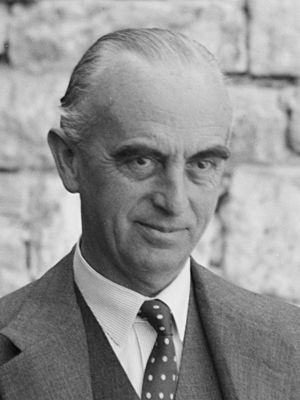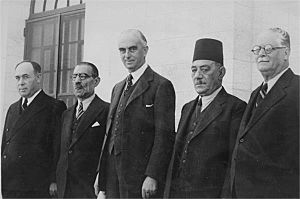Harold MacMichael facts for kids
Quick facts for kids
Sir Harold MacMichael
GCMG DSO
|
|
|---|---|
 |
|
| Governor of Tanganyika | |
| In office 19 February 1934 – 8 July 1938 |
|
| Preceded by | George Stewart Symes |
| Succeeded by | Mark Aitchison Young |
| High Commissioner of Palestine High Commissioner for Trans-Jordan |
|
| In office 3 March 1938 – 30 August 1944 |
|
| Preceded by | Arthur Grenfell Wauchope |
| Succeeded by | The Viscount Gort |
| Personal details | |
| Born | 15 October 1882 Birchover, Derbyshire, United Kingdom |
| Died | 19 September 1969 (aged 86) Folkestone, Kent, United Kingdom |
Sir Harold Alfred MacMichael (born October 15, 1882 – died September 19, 1969) was an important British official. He worked in different parts of the British Empire. He is best known for his time as the High Commissioner for Palestine. This was a key role in a region that faced many challenges.
Contents
Who Was Sir Harold MacMichael?
Sir Harold MacMichael was a British government official. He worked in various parts of the British Empire. He played a significant role in managing territories under British rule during the early to mid-20th century.
Early Life and Career
Harold MacMichael was born in Birchover, England, on October 15, 1882. He went to Bedford School and then studied at Magdalene College, Cambridge, where he did very well.
After finishing his studies, he joined the British government service. He started working in Sudan, which was then called Anglo-Egyptian Sudan. This was a territory managed by both Britain and Egypt. He worked in the Blue Nile Province area. Later, he became a senior inspector in Khartoum Province. By 1926, he had become a civil secretary, a high-ranking administrative position.
In 1933, MacMichael became the governor of Tanganyika, a large territory in East Africa. He served there until 1937, helping to manage the region for the British government.
Role in Palestine
In 1938, Sir Harold MacMichael took on a very important job. He became the High Commissioner for the British Mandate of Palestine. This meant he was the top British official in charge of Palestine. The British Mandate was a period when Britain managed Palestine after World War I.
Challenges as High Commissioner
During his time in Palestine, MacMichael faced many difficult situations. One notable challenge involved a ship carrying Jewish refugees in 1942. This situation led to much criticism regarding the handling of these refugees.
He also faced strong opposition from various groups in Palestine. This opposition sometimes led to serious security challenges for him and his family. For example, in 1944, just before he was replaced, he and his wife were in a dangerous situation, but they managed to stay safe.
After his role in Palestine, MacMichael also served as High Commissioner for a short time in Malta, another British territory.
The Malayan Union
After World War II, the British government wanted to reorganize how it managed the Malay states in Southeast Asia. In 1945, Sir Harold MacMichael was given the task of creating a new political structure called the Malayan Union.
Creating the Union
MacMichael was authorized to sign official agreements with the Malay rulers. He visited many of these rulers, starting with Sultan Ibrahim of Johor in October 1945. The Sultan agreed to the plan.
MacMichael continued to visit other Malay rulers to get their agreement. Many rulers were hesitant to sign these treaties. They worried about losing some of their royal power and feared their states might come under other influences.
The British government was determined to get these agreements. The rulers were pressured to sign, and many felt they had little choice. They were concerned about their positions if they refused. Later, some rulers said they hadn't been able to discuss the plans with their own councils or with each other.
The agreements gave the British government full control over most administrative matters in the Malay states. However, the rulers kept authority over Islamic customs.
Protests and Concerns
Many Malay people were very unhappy with these agreements. They felt that the treaties reduced the important role and respect held by their rulers. There were also concerns about granting citizenship to non-Malays, which caused tensions between different communities, like the Malays and the Chinese.
The strong disagreement with the Malayan Union and how MacMichael secured the agreements led to the rise of Malay nationalism. This was a movement where people in British Malaya began to strongly identify as Malays and sought more self-rule.
His Family
Sir Harold MacMichael had two daughters. His daughter Araminta married Toby Low, 1st Baron Aldington, who later became a well-known politician and businessman. His other daughter, Priscilla, married James Raynes, an officer in the US Navy.
Books He Wrote
Sir Harold MacMichael also wrote several books about his experiences and studies:
- The Tribes of Northern and Central Kordofán (1912)
- A history of the Arabs in the Sudan and some account of the people who preceded them and of the tribes inhabiting Dárfūr (1922)
 | Kyle Baker |
 | Joseph Yoakum |
 | Laura Wheeler Waring |
 | Henry Ossawa Tanner |


